By Archbishop Thomas Wenski - The Archdiocese of Miami
Photography: TOM TRACY | Courtesy
Archbishop Thomas Wenski preached this homily during a Mass Oct. 12, 2018 at St. Vincent de Paul Regional Seminary in Boynton Beach, just prior to the annual Friends of the Seminary dinner.
Jesus is on the way to Jerusalem where he is to “Passover” from this world into the next through his passion and death on the Cross. Along the way, he cures a deaf and dumb man, casting out a demon who had possessed the man. This “miracle” provokes another angry exchange between Jesus and the Pharisees which is what tonight’s Gospel reading places before us.
The Pharisees here are engaging in a tactic � still quite common today in politics. It is called "poisoning the well." They try to put down Jesus by associating him with something commonly repulsive � Beelzebub, for the Jews, is the Lord of the flies � that is, the Lord of the dung heap.
In the conduct of the Pharisees, we see something of the mystery of iniquity. In opposing Jesus, they didn't question the fact of the miracle. Today, of course, people are much more skeptical: We have a harder time believing in miracles and exorcisms. But even for the Pharisees, the miracle was obvious: The dumb man speaks. The Pharisees don't question the miracle, but they question the source of Jesus' power. He casts out devils, they say, by the power of Beelzebub.
There is something demonic about their opposition � for if Satan had rendered that man literally deaf and dumb, they are figuratively deaf, dumb and blind! Isaiah says, "Woe to those who call good evil and evil good." And isn't this the crisis of our age when evil is called good, and good evil?
Jesus is involved in a cosmic struggle: This is the struggle of life versus death; grace versus sin; God versus the devil. The outcome of this struggle has been decided � the Resurrection is Jesus’ victory over sin, death and the devil. The war is won, we might say; but Satan has yet to surrender: For “Satan and the evil spirits prowl about the world seeking the ruin of souls.” This cosmic struggle between good and evil continues � with skirmishes fought on many different fronts, and they will continue to be fought until the Lord returns in glory.
So, if the opponents of Jesus say that he cast out demons in the name of Beelzebub, we should not be surprised that our opponents say something similar about the Church and her ministry in the world today. To be sure, in this cosmic struggle between good and evil, there are casualties � and the history of the Church, a history of saints and sinners, of lights and shadows, shows this very well.
St. Augustine, living in 4th Century North Africa, as the Roman Empire collapsed around him, is not kind to those false shepherds who “when they took the milk and covered themselves with wool, they neglected the sheep” seeking their own cause and not Christ’s.
This summer’s Pennsylvania Grand Jury Report on historic cases of predation of the clergy on the youth, along with fallout over the disgrace of the once Cardinal (Theodore) McCarrick, and the former Nuncio’s “testimony,” formed a “perfect storm” that reopened wounds many thought were cauterized in 2002 when bishops in the US adopted a “zero tolerance” policy to those who abused minors and vulnerable adults.
That Grand Jury report did acknowledge that since 2002 an almost negligible number of priests have offended. But anger, especially towards Church leadership who in the past failed to address abuse, shows that 2002 came too late for too many victims.
St. Augustine asked � as many people do today: “But will there be shepherds who seek what is Christ’s and not what is theirs, and will they be found?”
“There will indeed be such shepherds,” he answers, “and they will indeed be found; they are not lacking, nor will they be lacking in the future.”
That is the promise of this seminary � a promise taken seriously by the bishops, by the faculty and by these young men themselves. When I get letters in which people, because of what they read on the blogs, ask me questions about the seminarians, I tell them our seminaries here in Florida are in good shape. These men are good, healthy men. And I tell them, if you don’t believe, go and see for yourselves.
Of course, I don’t need to tell you that. The promise of these seminarians has inspired your confidence and your support. Thanks to these young men, and thanks to your support of this seminary, there will be worthy shepherds who seek what is Christ’s and not what is theirs.
Despite their attempts to “poison the well,” Jesus tells the Pharisees: "If I drive out demons by the finger of God, then the Kingdom of God has come to you." And with that Jesus continues his journey. In this cosmic struggle between life and death, grace and sin, good and evil, the Kingdom is breaking into the world. He invites us to walk with him along the way to Jerusalem, to his Passion, Death and Resurrection. And as he set off, he probably told those Pharisees: “If you’re not going to walk with me along the way, then get out of the way.”
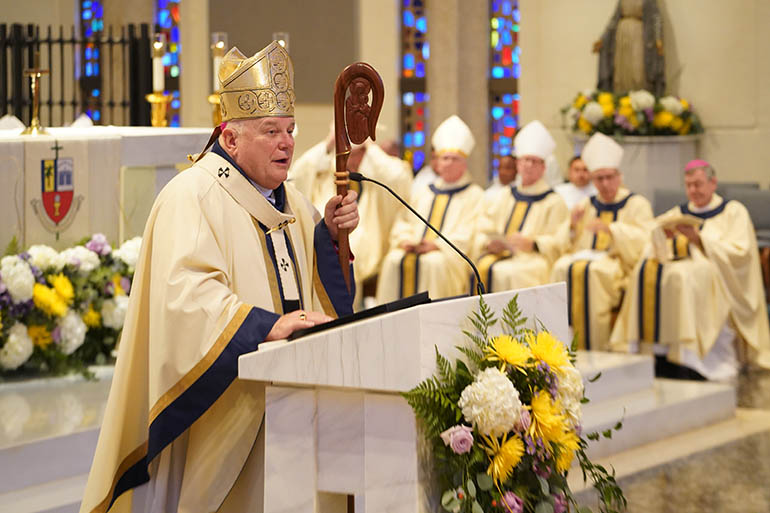
Photographer: TOM TRACY | FC
Florida's other bishops listen as Archbishop Thomas Wenski preaches the homily during Mass Oct. 12 prior to the annual Friends of the Seminary dinner at St. Vincent de Paul Regional Seminary in Boynton Beach, which serves all the dioceses in Florida and several outside the state..

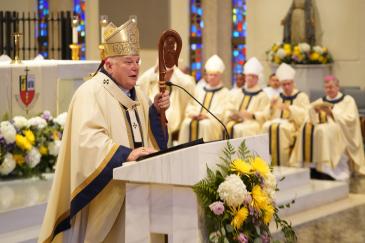
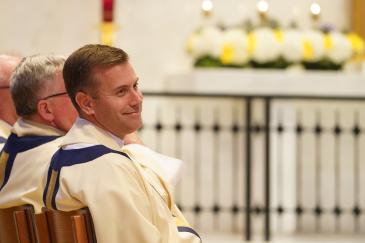
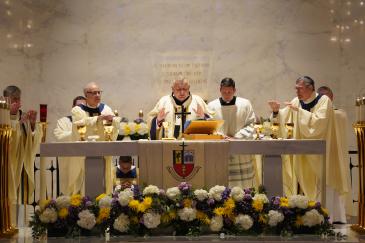
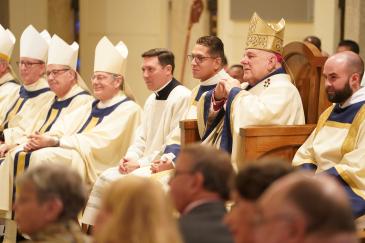
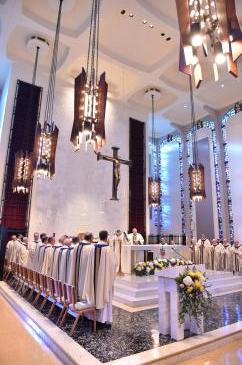

Comments from readers